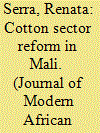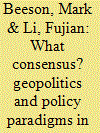| Srl | Item |
| 1 |
ID:
133614


|
|
|
|
|
| Publication |
2014.
|
| Summary/Abstract |
This paper provides a detailed analysis of the cotton sector reform process in Mali from 2000 to 2011, explaining reform delays and ambiguities in terms of the wider political and socio-economic context and aid relationships. Contrary to arguments pointing to lack of state commitment and ownership, domestic stakeholders increasingly worked towards finding an acceptable and consensual reform package. The process encountered quite serious obstacles, however, due to divergent actors' incentives, and the existence of opposing philosophies about what a restructured cotton sector should look like. As a consequence of donors' misjudgement of the political and social realities underlying the Malian cotton sector, dialogue among stakeholders was difficult and polarised, forcing the government to spend considerable time and resources to find a suitable compromise. This paper contributes to a better understanding of the merits and limits of pursuing consensual policy processes against the constraints posed by divergent donors' policy paradigms.
|
|
|
|
|
|
|
|
|
|
|
|
|
|
|
|
| 2 |
ID:
179968


|
|
|
|
|
| Summary/Abstract |
Long considered a smoker’s paradise, Japan passed its strictest regulations yet on indoor smoking in 2018 with revisions to the Health Promotion Law and a new ordinance in Tokyo. Timed for the Tokyo Olympics, both reforms made smoking regulations stronger and more legalistic despite reflecting distinctive policy paradigms in their particulars. The national regulations curtailed smoking in many public spaces but accommodated smoking in small restaurants and bars. Tokyo’s stronger restrictions emphasized public health protection by exempting only eateries with no employees. I argue that fully understanding these contemporaneous reforms requires analyzing insider activists: state actors who participated in the tobacco control movement or had sustained interaction with it during earlier reform waves. Case studies drawing on interviews and movement and government documents illustrate the mechanisms insider activists can access because they straddle multiple fields. This article contributes to scholarship about ideas, policy entrepreneurship, and the blurry line between insiders and outsiders in policymaking.
|
|
|
|
|
|
|
|
|
|
|
|
|
|
|
|
| 3 |
ID:
138339


|
|
|
|
|
| Summary/Abstract |
The Washington Consensus is not what it was. A model of development associated with the Untied States, it has been diminished both by apparent failures, widespread criticism and by the recent economic crisis that had its origins in the US. Anglo-American capitalism has lost a good deal of its influence and attractiveness. As a consequence, alternative models of development have become more prominent, especially the so-called Beijing Consensus. The authors argue that at one level this evolving policy discourse and debate reflects a long-term structural change in the relative positions of China and the United States. However, it is far from clear that this transformation has gone far enough to underpin a significant ideational or policy challenge on China's part. On the contrary, the debate in China demonstrates that there is little appetite for, or expectation of, a major paradigm change in the near future.
|
|
|
|
|
|
|
|
|
|
|
|
|
|
|
|